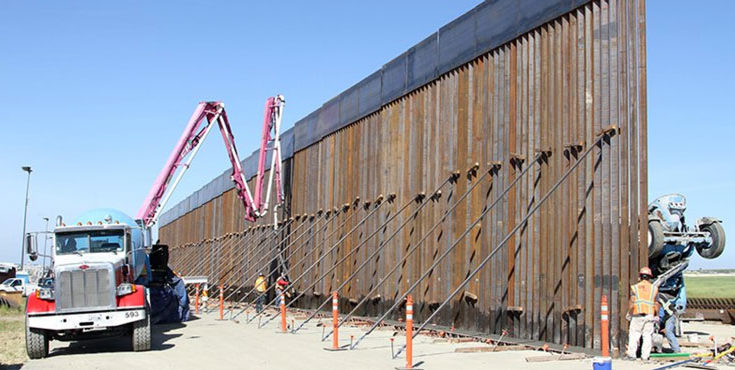Photo By Brooks Hubbard/U.S. Army Corps of Engineers: U.S. Army Corps of Engineers contractors pour foundations for new sections of border fence near Otay Mesa, Calif., in March. The Supreme Court recently reversed a court ruling that had blocked use of Pentagon funds on some border projects.
By Julian Paras/Cronkite News
WASHINGTON D.C. – Immigration advocates are vowing to continue to fight the use of Defense Department funds for construction of a border wall, after the Supreme Court late Friday lifted an injunction on the funds transfer.
The court’s divided ruling was hailed as a “big victory” by President Donald Trump, who declared a national emergency in February that he said let him shift billions from Pentagon and other sources to pay for wall construction that Congress rejected.
But advocates predicted that victory would be short-lived, saying they will be back in court to fight the president’s “direct assault on the checks and balances that represent the bedrock of our democracy.”
“This is not over. We will be asking the federal appeals court to expedite the ongoing appeals proceeding to halt this irreversible and imminent damage from Trump’s border wall,” said a statement from Dror Ladin, a staff attorney with the American Civil Liberties Union’s National Security Project.
The Department of Homeland Security did not respond to a request for comment Monday on that status of the funds.
The funds came under the emergency declaration issued by Trump after a 35-day government shutdown earlier this year when Congress and the White House deadlocked on border wall funding and failed to approve a federal budget.
That showdown ended Feb. 14 when Trump signed a budget that allocated $1.375 billion for a limited number of border barrier projects – far below the $5.7 billion Trump wanted for hundreds of miles of border wall. But immediately after signing the budget, the president declared the border emergency to set in motion the transfer of almost $6.6 billion not approved by Congress.
Among the opponents who went to court to block the transfer were the Sierra Club and the Southern Border Communities Coalition who asked a federal district judge to block the funding, arguing that only Congress has the authority to allocate funds.
“Trump’s desire to divert military funds for his deadly and dangerous wall will only further degrade the binational character of our region and threaten the quality of life of the 15 million people who call the southern border home,” said Vicki Gaubeca, director of the Southern Border Communities Coalition, on Friday.
Cronkite News video by Julian Paras
In a June ruling, U.S. District Judge Haywood S. Gilliam Jr. said the question was not “whether the plan is the right or wrong policy response to the existing conditions at the southern border” and the court “does not express any view as to them.” The question was whether the president exceeded his authority.
Gilliam said he did, issuing a permanent injunction in June that blocked the transfer of $2.5 billion from the Pentagon’s personnel accounts toward the border wall, including projects in the Yuma and Tucson sectors of the border.
A divided panel of the 9th U.S. Circuit Court of Appeals upheld that injunction earlier this month. But the Supreme Court voted 5-3 late Friday, with one partial dissent, to grant the government’s emergency request to block that injunction while the case works its way through the lower courts.
Advocates criticized the high court’s ruling.
“It’s problematic that there’s a message being sent that the president can proceed even though congress has said, ‘No,’” said Clarissa Martinez de Castro, the deputy vice president of policy and advocacy at UnidosUS.
“Regardless of what the Supreme Court may say about whether you may or may not be able to do something, I think the primordial question remains: Just because you can waste billions in taxpayer dollars, should you? And that answer is no,” Martinez de Castro said.
But Dan Stein of the Federation for American Immigration Reform, which advocates for limited immigration, said Trump made the right move in the face of congressional opposition.
“The idea that Congress, sitting on its hands, is going to allow the country to literally be overwhelmed by people ignoring our laws – drug traffickers, cartels and others,” Stein said Monday. “Therefore it’s an appropriate exercise of his authority to reprogram funds by building a wall on the border.”
That does not mean construction is about to begin – the government argued that it needed the injunction to be lifted so that it could award construction contracts before the Sept. 30 end of the fiscal year.
Sierra Club managing attorney Gloria Smith said opponents would continue to oppose construction of a barrier that will “wall off and destroy communities, public lands, and waters in California, New Mexico, and Arizona.” Martinez de Castro called the project “a symbol of waste.”
But Stein said a wall is long overdue.
“There’s nothing like good old-fashioned bricks and mortar to build a wall to deter and channel the flow of people coming illegally, drug traffickers and others,” he said. “And that’s what’s needed.”









